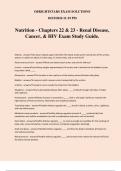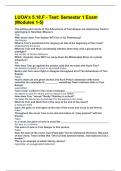©BRIGHTSTARS EXAM SOLUTIONS
10/23/2024 11:19 PM
Nutrition - Chapters 22 & 23 - Renal Disease,
Cancer, & HIV Exam Study Guide.
Kidneys - answer✔Two bean-shaped organs that filter the blood; make up the central part of the urinary
system; in adults are about 5 inches long, 2.5 inches wide, and an inch thick?
Renal artery and vein - answer✔What two blood vessels enter and exit the kidneys?
Ureters - answer✔Each kidney weighs approximately 4-6 ounces and is attached to the bladder by two
long tubes called ____.
Glomerulus - answer✔The location in the nephrons of the kidneys where filtration take place.
Bladder - answer✔A reservoir which receives urine transported by the ureters.
Urethra - answer✔Transports urine outside the body from the bladder.
50 gallons - answer✔Every day healthy kidneys filter about ____ of blood through 140 miles of tubes
and nephrons.
Homeostasis - answer✔Kidney function is essential to ____, that is, the body's ability to maintain the
right balance of fluid, hormones, electrolytes and acid/base balance.
Total body water - answer✔Healthy kidneys regulate the ____ found in blood, arteries, veins, capillaries,
and interstitial spaces.
Metabolic waste products - answer✔Healthy kidneys regulate removal of ____ produced by food
metabolism and cellular metabolism (as well as medications and toxins such as alcohol).
Electrolytes - answer✔Healthy kidneys regulate ____ to ensure enough are available for the workings of
body cells, nerve stimulation, muscle contraction, and blood coagulation (clotting).
Acids and bases - answer✔Healthy kidneys regulate ____ and thus the body's metabolic pH levels for
vital cellular activities.
Blood pressure - answer✔Healthy kidneys regulate ____ and secrete rennin when the volume of fluid in
the blood vessels declines.
, ©BRIGHTSTARS EXAM SOLUTIONS
10/23/2024 11:19 PM
Red blood cells - answer✔Healthy kidneys regulate the production of the ____ that carry oxygen. Thus,
when the kidneys detect a decrease in oxygen concentration they secrete erythropoietin, which in turn
stimulates the bone marrow to make more of them.
Vitamin D - answer✔Healthy kidneys regulate the synthesis of _____ to its active form, calcitrol, a
substance necessary for the body to absorb calcium.
Nephrotic syndrome - answer✔This terms describes any kidney disorder that results in excess protein in
the urine (proteinuria).
Plasma proteins - answer✔Nephrotic syndrome can develop when damage to the glomerular capillaries
increases their permeability to ____, allowing protein to escape into the urine.
Increased risk of developing heart disease and stroke - answer✔Consequences of nephrotic syndrome
include edema, ____ (due to elevated LDL and VLDL levels), loss of immunoglobulin resulting in
increased infections, and loss of vitamin-D binding protein resulting in potential rickets and
osteomalacia.
Lipid-lowering - answer✔The medications (along with medical nutrition therapy) used to manage
Nephrotic syndrome include anti-inflammatory agents, ACE inhibitors, immunosuppressants,
antihypertensive agents, diuretics, and ____ medications.
Triglycerides - answer✔Providing excessive amounts of dietary protein will result in storage of amino
acids as ____, causing increased nitrogen and overworking the kidneys.
Acute and chronic - answer✔The two types of renal failure: ____.
Dialysis - answer✔This is the process of "cleaning" or filtering the blood by diffusion and can be done by
Hemodialysis (uses a dialyzer to filter the blood) or Peritoneal dialysis (uses the body's peritoneum as a
filter).
Acute renal failure - answer✔A sudden halt in kidney function, usually for a few days or weeks, which
may be reversible.
Acute pre-renal failure - answer✔Caused by a decreased flow of blood to the kidneys, which may be due
to shock, burns, hemorrhaging (bleeding), and gastrointestinal malignancies (cancers/tumors).
Acute intra-renal failure - answer✔This condition is caused by kidney damage from substances such as
drugs, heavy metals, certain plant and animal substances, x-ray dyes or environmental agents such as
pesticides, inflammation, immune disorders, trauma, obstruction, hemolysis, systemic and vascular
disorders, and complications related to pregnancy.
Acute post-renal failure - answer✔Occurs when urine is prevented from leaving the body and caused by
kidney stones, prostate problems, congenital abnormalities, or mass occupying lesions (tumors).





